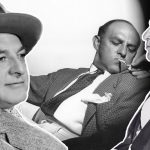If there’s one actor who exemplified the leading man and the American hero, it was Gregory Peck.
Whether it was as Atticus Finch or Hugh O’Flaherty he gave some of the best performances we’ve seen in American cinema. Through his roles he showed an incredible range of emotions from stoicism to intense passion.
But what was Gregory Peck like off-screen? He had a different persona when he was not working, and his life wasn’t without its struggles. He struggled to become a successful actor, and even after attaining stardom, he experienced several personal tragedies throughout his life.
So how did he overcome these struggles? What did he think about his roles and the acting profession?
Let’s learn about the incredible life and career of Gregory Peck…
EARLY LIFE
Eldred Gregory Peck was born on April 5, 1916, in San Diego. His mother named Bernice Mary, and his father named Gregory Pearl Peck. Eldred’s father worked as a chemist, so it certainly not expected that young Eldred would grow up to become a movie star!
His love for cinema came from his grandmother. Gregory Peck was an only child and spent much of his childhood with his grandmother rather than his parents. His grandmother would take him to the cinema each week and it’s clear that, at a young age, he fantasized about one day seeing himself on the big screen.
While he began studying Pre-Med at UC Berkeley, he soon got bored and decided that it’s time to pursue his true calling.
He moved to New York and enrolled in the Neighborhood Playhouse. Here, he honed his craft and was on his way to becoming a professional actor.
Before we tell you more about Gregory Peck’s life and career, please like this video and subscribe to our channel for more current news and interesting stories. Now, back to the video…
_______________________________________________________________________
EARLY CAREER
Upon graduation from the Neighborhood Playhouse, Gregory Peck made his Broadway debut. His first play was “The Morning Star” which he debuted in 1942. He made his film debut the following year in Days of Glory.
He received his first Academy Award nomination for his role in The Keys of the Kingdom. Another great role was in Alfred Hitchcock’s film Spellbound. He continued to act regularly throughout the 1940s and received yet another Academy Award nomination for his role in the film Gentleman’s Agreement.
He had developed a reputation for playing characters that displayed a great moral compass. His career began as the Second World War was ending. It was during this time that audiences wanted to see powerful characters who could display virtue. Gregory Peck was the perfect actor for this.
_______________________________________________________________________
THE 1950s and 1960s
Gregory Peck’s career lasted until the late 1990s. But the decades which defined his acting were the 1950s and 1960s.
In 1951, he appeared in the romantic comedy film Roman Holiday – alongside Audrey Hepburn. His role as Joe Bradley showed his softer side and showed that he could also be a great leading man.
In the early 1960s, he starred in two great Westerns – The Guns of Navarrone and How the West Was Won. These roles showed his range and that he could adapt to different genres. He also appeared in the thriller Cape Fear alongside Robert Mitchum.
In this film, he played Sam Bowden – a lawyer whose family gets tormented by Max Cady – a newly-released criminal who served a long jail sentence because of Sam’s testimony. This was a rather frightening film for its time and still holds up as one of Hollywood’s most suspenseful and thrilling films. Gregory Peck’s role as Sam Bowden is a true depiction of heroism in the face of danger.
But it was in 1962 that Gregory Peck gave one of his most memorable performances. Once again, he played a small-town lawyer. This time, he got defending a black man who was falsely accused of rape by a white woman.
The film was based on a best-selling novel that Gregory was a huge fan of. The film, of course, was To Kill A Mockingbird, and the character was Atticus Finch. With this performance, Atticus Finch portrayed the archetypical American hero that audiences still wish to see today.
He’s the perfect actor to play the role, and Harper Lee, who wrote the novel, was especially impressed by his performance. The two remained friends until Gregory Peck’s death. Gregory Peck’s performance as Atticus Finch named as the #1 screen hero by the American Film Institute in its documentary special, “100 Years, 100 Movies, 100 Heroes & Villains”.
It’s also widely believe that Atticus Finch, Gregory Peck’s favorite performance of his own. He continued to have a great career throughout the 60s all the way to the 1990s. But it’s his performance as Atticus Finch that defines his acting style and his on-screen persona.
But what was Gregory Peck like off-screen?
____________________________________________________________________________
GREGORY’S STRUGGLES
While it may seem like Gregory Peck had an easy path to success, he faced many struggles on his way to stardom.
During the early years of his acting career, he had to work odd jobs to pay the bills. His Broadway debut wasn’t particularly successful. It was only after his transition to films that he began receiving regular acting work.
Gregory Peck had many hardships in his personal life that took their toll on him. His first marriage to Greta Kukkonen lasted from 1942 to 1955 when they got divorce. With Greta, he had three children.
Sadly, two of his son’s faced personal tragedies throughout their lives. His son, Jonathan, had an illustrious life. He spent time in the Peace Corps, volunteered in Tanzania for a few years, and worked at a radio station in the USA.
Like his father, Jonathan had the public image of showcasing high morals and decency. Nevertheless, he sadly suffered from internal strife that’s still largely unknown. At the age of 31, he committed suicide by gunshot.
The pain that Gregory Peck felt was unimaginable and he didn’t work for two years. His son Anthony also had several personal issues – including drug addiction, alcohol addiction, and a divorce from model Cheryl Tiegs.
These hurdles, however, didn’t stop Gregory from continuing to pursue a great acting career. He also dedicated his life to helping his children live great lives. His son Steven is a philanthropist who helps the homeless, and his daughter Cecilia followed in her father’s footsteps and became an actress.
Behind the scenes, Gregory Peck’s life had its challenging moments. Nevertheless, he always maintained his dignity and carried on. Such a display of dignity was what was expected in those days, and it’s something that many audiences wish they could see from today’s movie stars.
From Gregory Peck’s life, we can learn how to overcome pain and continue to strive for a better life…
GREGORY PECK’S PERSONA
But what was Gregory Peck’s persona like off-screen? In many ways, according to his son Anthony it was rather different. In some ways, he was just like his most famous characters.
Gregory Peck was known to have the friendliness and loyalty that one would expect from an Atticus Finch. He had the kindness and carefree attitude of a youngerJoe Bradley.
But he also had a certain sophistication fitting for a Hollywood star. He loved wearing bespoke suits, having a particular affinity for the tailor H. Huntsman & Son’s – found on London’s Savile Row Street.
Not only did he love wearing the clothes, but he also enjoyed having a glass of wine with his second wife Veronique to discuss the work behind the suit. He truly exemplified the classiness of Old Hollywood – setting an example that New Hollywood has a lot to learn from!
To this day, Gregory Peck is renowned not just for his incredible acting but also for his off-screen persona and how he carried himself. The eyeglass brand, Oliver Peoples, created their own pair of glasses named after the actor. These are reminiscent of the glasses he wore as Atticus Finch in To Kill a Mockingbird.
It’s likely that he’ll continue to be an influence on younger actors – not just by his performances but also by his personality.
In fact, Gregory Peck’s influence didn’t just influence American cinema. The iconic Indian actor Dev Anand was often referred to as the ‘Gregory Peck of India’ as he not only played heroic characters but also had an amicable off-screen persona and fashion sense that shaped what became fashionable among young Indian men.
GREGORY PECK’S LEGACY
Gregory Peck’s last role was as Father Mapple in the 1998 TV mini-series Moby Dick. This was the second time he appeared in an adaptation of Herman Melville’s novel. The first time was in a 1956 film adaptation in which he played Captain Ahab.
He had been offered to play Grandpa Joe in the film Charlie and the Chocolate Factory but sadly passed away before the film began production. He was also one of the most requested guests for the interview show Inside the Actor’s Studio – but sadly passed away before he could appear.
His family created the Gregory Peck Award for Cinematic Excellence in 2008. This is an award given to a cinema professional who has made strides in the industry. Previous recipients of this prestigious award include Laurence Fishburne, Sir Patrick Stewart, Alan Arkin, Laura Dern, Annette Benning, and Gabriel Byrne.
Eldred Gregory Peck died in 2003 at the age of 87 from bronchopneumonia. He left behind a great legacy of film, television, stage, and radio performances. He was one of American cinema’s greatest leading men and often represented the ideal American through his roles.
His life and career are one to emulate and one that’ll inspire generations to come…


